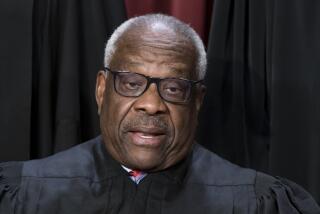Marshall Says Bush Should Not Use Race as ‘Excuse’ for Picking Wrong Successor : Supreme Court: The retiring justice at a press briefing shows his usual feistiness. ‘What’s wrong with me? I’m . . . coming apart,’ he tells reporters.
WASHINGTON — Retiring Justice Thurgood Marshall, the only black ever to serve on the U.S. Supreme Court and in recent years its leading liberal voice, said Friday that President Bush should not use race as “an excuse” for picking the wrong person to succeed him.
Showing characteristic feistiness, Marshall sat impatiently tapping his cane throughout a news conference at which he resolutely fended off questions about his views on the high court’s direction or social trends.
Asked whether Bush has an obligation to replace him with a minority member, Marshall said: “I don’t think (race) should be used as an excuse one way or the other . . . . I mean for picking the wrong Negro, and saying, ‘I’m picking him because he is a Negro.’ I am opposed to that.”
He added: “There’s no difference between a white snake and black snake. They’ll both bite.”
But at the same time, Marshall stopped short of saying that race should not be a factor in picking his replacement.
“Of course I didn’t say that,” he said.
Marshall, named to the court in 1967 by then-President Lyndon B. Johnson, said that he, his wife and his doctor had been discussing the possibility of his retirement during the past six months. Marshall, who turns 83 next week, cited his “advancing age and medical condition” in announcing his resignation Thursday.
Pressed at Friday’s news conference about his ailments, he said: “What’s wrong with me? I’m old. I’m getting old and coming apart.”
Asked whether he will write his memoirs, Marshall said the only plan he had for his retirement was to “sit on my rear end.”
Asked to assess his legacy, he replied: “I don’t know what legacy I left. It’s up to the people.” As to the epitaph he would like, he said: “He did what he could with what he had.”
Marshall walked into the Supreme Court’s East Conference Room with difficulty, and as he faced reporters there, his breathing appeared labored. He was greeted with an ovation by court employees and other well-wishers who had crowded into the room for the news conference.
With typical contrariness, he refused to sit in kingly style on the red-carpeted platform that had been set up for him and chose instead to answer questions from a chair on the floor--a decision that caused television cameramen to strain to get their shots.
It had been reported that frustration over constantly being in the minority of the increasingly conservative court was one reason for his retirement. “Well, that’s a double-barreled lie,” Marshall said.
Marshall brushed aside repeated entreaties by reporters to reflect upon his past as a civil rights advocate or to comment upon race relations in this country, saying he had given that up when he first was named to the bench.
“I don’t look back. I look forward,” he said.
At one point, Marshall--who rejects the term black for his race--chided a reporter who asked if black people are better off today. “In the first place, I am not a black people. I am an Afro-American. Now, you want to talk about Afro-Americans?” he said.
Yet he conceded, indirectly, that the issue of race still dogs him. “I’m not free,” he said.
He told a story of a Pullman porter he had known as a child. “He had been in every city in this country, he was sure, and he had never been in any city in the United States where he had to put his hand up in front of his face to find out he was a Negro,” Marshall said. He added: “I agree with him.”
Marshall first gained national fame as the lead attorney in the long legal fight that culminated in the landmark 1954 Supreme Court decision declaring segregated school systems unconstitutional. Aside from his 24-year tenure on the Supreme Court, he served on the federal appeals court.
But asked Friday which of his “various careers” he was most proud of, Marshall cited his 1965-67 stint as solicitor general, the lawyer who represents the federal government before the Supreme Court.
“As solicitor general, you are in the dead middle of everything that’s legal and you have your 2 cents to put in and maybe that was the best.”
Staff writer David G. Savage contributed to this story.
More to Read
Get the L.A. Times Politics newsletter
Deeply reported insights into legislation, politics and policy from Sacramento, Washington and beyond. In your inbox three times per week.
You may occasionally receive promotional content from the Los Angeles Times.









